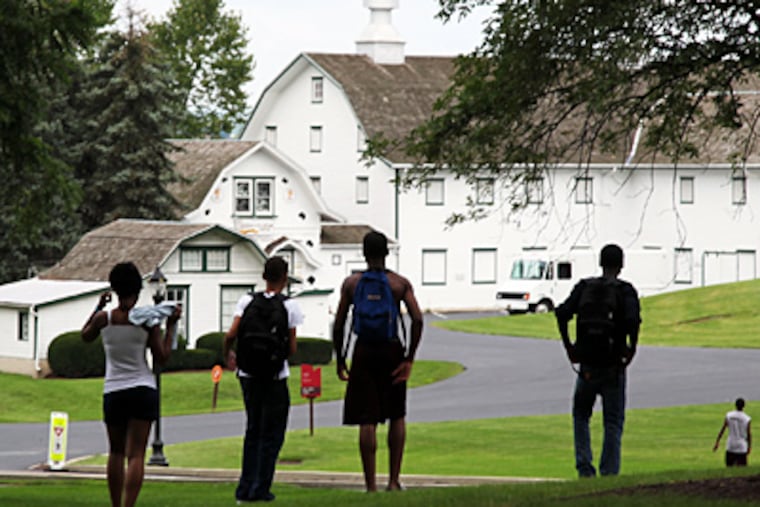Hershey School sued after rejecting HIV-positive teen
He was smart, ambitious, and poor. Thus, on paper, the 13-year-old applicant appeared to meet the basic criteria for admission to the well-regarded Milton Hershey High School for disadvantaged children.

He was smart, ambitious, and poor. Thus, on paper, the 13-year-old applicant appeared to meet the basic criteria for admission to the well-regarded Milton Hershey High School for disadvantaged children.
But he also happened to be HIV-positive, and on that basis the unidentified Delaware County teenager was denied entry into the boarding school founded by the nation's most-famous chocolate merchant.
In a case that has generated national attention, the AIDS Law Project of Pennsylvania has filed suit in federal court, saying the school violated the Americans with Disabilities Act and "multiple antidiscrimination laws."
The suit, filed last week on behalf of "Abraham Smith," seeks to have Hershey reverse its decision and asks for unspecified damages for the student and his mother, with whom he lives.
AIDS Law Project attorney Ronda B. Goldfein on Wednesday described Hershey's decision as "unbelievable."
In a statement issued Tuesday night, the school said it was acting "to protect the students already in our care" in what it called "a unique environment."
The suit noted that HIV cannot be transmitted through casual contact, and that the Centers for Disease Control and Prevention had recorded no cases of transmission resulting from participation in any sports.
When he heard he was rejected, "I couldn't believe it," Smith, who takes medication daily, said in an e-mail response. "After I thought about it for a while, it sunk in why they didn't want me."
"This decision was not made based on bias or ignorance," the school said. "We understand that the risks presented by an HIV-positive individual who is on medication are low."
But, the statement said, "Our teenagers are the same as teens all across the country. Despite our best efforts, some of our students will engage in sexual activity with one another."
Students live in groups of 10 to 12, supervised by married "house parents," the school said.
It said the situation with the 13-year-old was compounded by the fact that by law it could not disclose his HIV status.
"We concluded that the risk was significant and rose to the level of a direct threat to the health and safety of others," the statement said.
"If I were a Hershey parent," Goldfein said, "I would think you really don't have any control over the kids at all. You're not supervising the kids at night."
The suit faulted the school for failing "to make any individualized assessment as to whether Abraham's HIV status posed a direct threat."
It said Hershey violated the disabilities act, which prohibits discrimination against the disabled in "any place of public accommodation." That would include a private school, according to the U.S. Justice Department.
"Persons with HIV/AIDS will rarely, if ever, pose a direct threat in the public accommodations context," the department states.
"Unlike public schools, the Milton Hershey School is not required to accept every student," the school said. "We can lawfully exclude students who do not meet our eligibility criteria."
In the school's 1909 deed of trust, updated in 1976, the school said it would admit "only a child deemed poor and healthy . . . of good character . . . [and who] has potential for scholastic achievement."
"We believe we did the right thing in the instance of Abraham Smith," the school said.
Goldfein likened the case to that of Indiana teenager Ryan White. White was expelled from middle school when his HIV diagnosis became known. Before he died at 18 in 1990, he had become a national celebrity and made frequent public appearances.
Said Goldfein, "The idea that we're having the same issue is pretty stunning."
Smith said he had been gratified by the support he had received, and for all who responded negatively, he said, "I hope you never have to walk in my shoes."